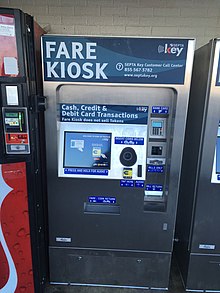SEPTA Key
Tokens for bus, trolley and subway fare could be purchased from a vending machine at some stations, however exact change was required.
The initial rollout of the key card on transit services began with an early adoption program starting on June 13, 2016.
[4] As of June 1, 2017, weekly and monthly TransPasses (for urban transit, distinct from the TrailPasses for SEPTA Regional Rail) were no longer available in the old format, and users of those passes had to have a Key Card.
[11] On October 1, SEPTA expanded the program to include select Zone 3 stations for Monthly and Weekly TrailPass holders.
[14] On July 13, 2020, the Travel Wallet feature launched on Regional Rail, replacing tickets and cash, along with the Cross County Pass on a SEPTA Key card.
[18] Effective January 1, 2024, SEPTA no longer accepts previously purchased tokens at vehicle fareboxes or fare kiosks.
A rider with a quick trip ticket will swipe it at a black card reader mounted next to the red pad to access the boarding area.
SEPTA Key cards were formerly accepted on DART First State buses in northern New Castle County, Delaware.
At the time, it was estimated the project would take about three years and cost approximately $100 million, based on the implementation of similar fare payment systems in other cities.
[26] After the bid deadline for contractors was extended several times,[27] in 2011 the SEPTA Board awarded a $129.5 million contract to ACS Transport Solutions Group, a division of Xerox, with 2013 as a target date for completing the implementation.
[28] By 2013, the project was said to be a few months behind schedule, with SEPTA's Chief Officer of New Payment Technology John McGee stating "That ball of steam isn't as large as we'd like, but we're still moving along."
This feature allows for occasional riders to buy passes for all modes of rapid transit (except Regional Rail) from a smartphone that can be scanned as a ticket via QR code.
[33] There have been some complaints about SEPTA Key Tix, which have included difficulties of using the platform, disuse of money stored in the "travel wallet" to buy tickets, and no integration with mobile payment services such as Apple Pay and Google Pay;[32] however, SEPTA has announced plans to support those and other forms of contactless payment within the program in the near future.
